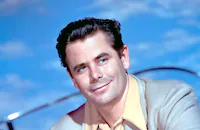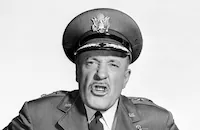Don't Go Near the Water

Brief Synopsis
Cast & Crew
Charles Walters
Glenn Ford
Gia Scala
Earl Holliman
Anne Francis
Keenan Wynn
Film Details
Technical Specs

Synopsis
On the South Pacific island of Tulura, pompous ex-stockbroker Lt. Cmdr. Clinton T. Nash, a sailor who has never left land, heads up the Naval public relations department with a small staff of "dry land sailors." To counter Adm. Boatwright's opinion that the department is a bunch of "oddballs and freaks," Nash assigns his men various tasks to assuage the demanding correspondents and promote a romantic, albeit false, picture of the Tuluran people as quaint natives with their own language. While taking two junketing congressman on an island tour, Lt. Max Siegel, the only member of the public relations department who has seen sea duty, is surprised to meet a very well-educated and beautiful young Tuluran woman named Melora Alba.
The next day, playboy Lt. Ross Pendelton wants to avoid competition when dating one of only a handful of American women on the island and asks Pvt. Adam Garrett for a favor. Knowing that enlisted men are forbidden to date above their rank, Pendelton suggests Adam act as the required escort during his date with Lt. Alice Tomlen. Meanwhile, Siegel finds Melora at a run-down village schoolhouse where she teaches without the benefit of reference books. After several visits to the school to provide research materials for the children, the love-struck Siegel asks to call Melora by her first name, having been relegated to calling her Miss Alba, but Melora refuses, reminding him that Tuluran custom differs from his own. Days later, Nash responds to criticism about the use of department funds to build a new officers' club by ordering his office workers to finish the job; however, the inexperienced men's slapdash attempts at construction only lead to the building's near collapse. When Nash is ordered to polish the Navy's public image, Siegel suggests that publicity profiling a "typical" enlisted sailor would ignite the public's enthusiasm for the Navy.
Days later, Adam seeks Siegel's help in arranging a date with Alice. That night, as Adam is driving Pendelton and Alice on their date, Siegel and several other men blow out the jeep's tires with gunshot and then abduct Pendelton while Adam shields Alice from learning the identity of the culprits. Once alone, Adam professes his love and confesses that the abduction was a ruse to be close to her. Alice is so impressed with the lonely man's determination that she asks Adam to remove her bars and kiss her. The next day, Siegel takes Alice on a date, but lets Adam sit in back seat with Alice once they are out of sight of the base. Upon receiving a set of encyclopedias for the school from Siegel days later, Melora finally calls him by his first name and invites him to meet her father. Melora's wealthy family home and her father's worldly experience easily intimidate the nervous Siegel. When Melora's father to invites Siegel to a game of chess; however, the one-time college champ accepts the challenge, knowing he has finally found some common ground.
Later, Siegel is at the officer's club bar when arrogant correspondent Gordon Ripwell shows the crowd a one thousand dollar bill signed by his esteemed publisher that he keeps in his wallet. A few days later, Siegel suggests to Melora that if she would set Ripwell up on a date with one of her girl friends, he could persuade him to donate money to rebuild the school. After tape recording Ripwell's attempts to seduce the young woman, Siegel blackmails the writer by threatening to tell his publisher about his romantic adventure with an under-aged Tuluran girl unless he turns over the $1,000. Meanwhile, Nash's "typical" enlisted man turns out to be Farragut Jones, a ribald seaman who spews profanity. Assigned to convert Farragut into a presentable character in three days, Siegel plies the love-starved man with booze and promises that women will swoon at his new fame.
Three days later, Farragut's flawless recitation of Spiegel's speech glorifying Navy life surprises everyone, even Boatwright. Meanwhile, when Adam is caught dating Alice, Siegel suggests to the gullible Nash that sea duty is a suitable punishment, knowing the sentence is one Adam would gladly take. Months later at a ceremony for the rebuilt school, Ripwell congratulates Melora on her "diligence" in getting the money. Comprehending that it was Melora who was alone with Ripwell, Siegel is stricken with guilt and realizes that he wants Melora for his own. When he then proposes to her, they both recognize that marriage is impossible because of his responsibilities back in New York and her obligation to the Tuluran school children. Days later, Nash assigns Siegel to be the escort for correspondent Deborah "Debbie" Aldrich, who insists on covering combat operations. Siegel soon finds himself onboard a battle ship with Debbie and 1,700 sailors who have not seen a woman in 31 months.
Despite the admiral posting a six-man, 24-hour patrol to guard on Debbie, her black lace panties are soon seen hanging from a ship's cable as a pennant. Months later, during the Allie's victory party at the officer's club, Siegel announces to the audience that Nash has a surprise plan, which as usual, is also a surprise to Nash. After dedicating the officer's club as a recreation facility for the Tuluran people, Siegel names himself as the facility's supervisor and eyes Melora in the crowd. With her father's consent, Melora joins Siegel on the dance floor, where Adam, who has just returned from combat, is happily dancing with Alice. When Ripwell proposes a toast to public relations department, all raise their glasses to Debbie's newly framed pair of black lace panties on the club wall.

Director

Charles Walters
Cast

Glenn Ford

Gia Scala

Earl Holliman

Anne Francis

Keenan Wynn

Fred Clark

Eva Gabor

Russ Tamblyn

Jeff Richards

Mickey Shaughnessy
Howard Smith
Romney Brent

Mary Wickes
Jack Straw
Robert Nichols
John Alderson

Jack Albertson
Charles Watts
Julian Rivero
Ike Gibson
Don Burnett
Jerado De Cordovier
Maiola Kalili
King Kong
Hugh Boswell
Tom Mayton
Wilson Wood
Dick Gardner
John Dennis
Steve Warren
William O. Joyce
Gregg Martell
John L. Cason
Paul Bryar
Audrey Swanson
Mike Steen
Lowell Brown
Crew
Robert Bronner
Sammy Cahn
Adrienne Fazan
Dave Friedman
A. Arnold Gillespie
Sydney Guilaroff
Charles K. Hagedon
William A. Horning
Jay Humbrock
Hugh Hunt
Al Jennings
Bronislau Kaper
Bronislau Kaper
Dorothy Kingsley
Kendrick Kinney
Lowell Kinsall
Lee Leblanc
John Lipow
Urie Mccleary
Dr. Wesley C. Miller
Helen Rose
William Tuttle
Lawrence Weingarten
George Wells
Edwin B. Willis

Photo Collections
Videos
Movie Clip




Trailer
Film Details
Technical Specs

Articles
Don't Go Near the Water

Don't Go Near the Water
Quotes
Trivia
Notes
The following written prologue precedes the onscreen credits: "A Great Naval Commander once said, `Don't Give Up the Ship!' The Sailors in our story aren't worried about this. They have no ships to give up. In fact they Don't Go Near the Water.." This is followed by voice-over narration provided by Keenan Wynn as correspondent "Gordon Ripwell," who introduces the story of the "dry land sailors."
According to a January 30, 1957 Hollywood Reporter news item and a March 1, 1957 Hollywood Reporter production chart, Anna Kashfi was to star in the film; however, she was replaced by Gia Scala. A June 25, 1956 Hollywood Reporter "Rambling Reporter" news item states that Ernest Borgnine was considered for the lead role. As noted in reviews, the character "Farragut Jones" is scripted to use profanity throughout his scenes, but a loud "bleep" used for comic effect drowns out his voice each time he utters profanity. Don't Go Near the Water includes actual World War II combat footage in the film's battleship scenes.

Miscellaneous Notes
Released in United States Winter December 1957
CinemaScope
Released in United States Winter December 1957














